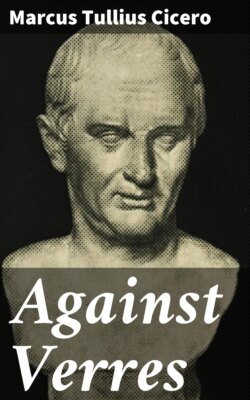Читать книгу Against Verres - Marcus Tullius Cicero - Страница 70
На сайте Литреса книга снята с продажи.
48
ОглавлениеTable of Contents
There was a man called Caius Sulpicius Olympus. He died while Caius Sacerdos was praetor. I don't know whether it was not before Verres had begun to announce himself as a candidate for the praetorship. He made Marcus Octavius Ligur his heir. Ligur thus entered upon his inheritance; he took possession while Sacerdos was praetor, without any dispute. After Verres entered on his office, in accordance with his edict, an edict such as Sacerdos had not issued, the daughter of the patron of Sulpicius began to claim from Ligur a sixth part of the inheritance. Ligur was absent. His brother Lucius conducted his cause; his friends and relations were present. That fellow Verres said that, unless the business was settled with the woman, he should order her to take possession. Lucius Gellius defended the cause of Ligur. He showed that his edict ought not to prevail with respect to those inheritances which had accrued to the heirs before his praetorship; that, if this edict had existed at that time, perhaps Ligur would not have entered upon the inheritance at all. This just demand, and the highest authority of influential men, was beaten down by money. 126Ligur came to Rome; he did not doubt that, if he himself had seen Verres, he should have been able to move the man by the justice of his cause and by his own influence. He went to him to his house; he explains the whole business; he points out to him how long ago it was that the inheritance had come to him and, as it was easy for an able man to do in a most just cause, he said many things which might have influenced any one. At last he began to entreat him not to despise his influence and scorn his authority to such an extent as to inflict such an injury upon him. The fellow began to accuse Ligur of being so assiduous and so attentive in a business which was adventitious, and only belonging to him by way of inheritance. He said that he ought to have a regard for him also; that he required a great deal himself; that the dogs whom he kept about him required a great deal. I cannot recount those things to you more plainly than you have heard Ligur himself relate them in his evidence. 127What are we to say, then, O Verres? Are we not to give credence to even these men as witnesses? Are these things not material to the question before us? Are we not to believe Marcus Octavius? Are we not to believe Lucius Ligur? Who will believe us? Who shall we believe? What is there, O Verres which can ever be made plain by witnesses, if this is not made so? Or is that which they relate a small thing? It is nothing less than the praetor of the city establishing this law as long as he remains in office,--that the praetor ought to be co-heir with all those to whom an inheritance comes. And can we doubt with what language that fellow was accustomed to address the rest of the citizens of an inferior rank, of inferior authority, and of inferior fortune; with what language he was accustomed to address country people from the municipal towns; with what language he was accustomed to address those whom he never thought free men,—I mean, the freedmen; when he did not hesitate to ask Marcus Octavius Ligur, a man of the highest consideration as to position, rank, name, virtue, ability, and influence, for money for deciding in favour of his undoubted lights?
